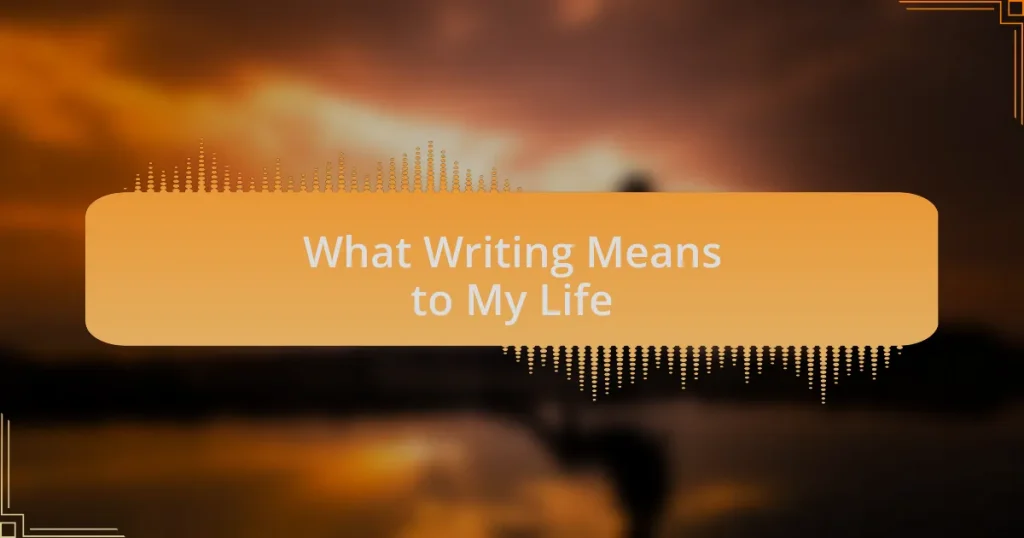Key takeaways:
- Evelyn Hartwood uses writing as a means to explore and express complex emotions and human relationships.
- Writing serves as a dual experience, being both a solitary act of self-discovery and a communal activity that fosters connections among writers.
- Personal experiences, such as volunteering and dealing with heartbreak, significantly inspire her writing, allowing her to infuse authenticity and emotion into her narratives.
- Traveling enriches her creative process, as new experiences shape her writing and provide a wealth of inspiration.
Author: Evelyn Hartwood
Bio: Evelyn Hartwood is a contemporary novelist known for her compelling narratives and richly drawn characters. With a background in psychology, she explores the complexities of human emotion and relationship dynamics within her stories. Evelyn’s debut novel, “Whispers of the Heart,” received critical acclaim and was shortlisted for several literary awards. When she’s not writing, she enjoys hiking in the mountains and experimenting with new recipes in her kitchen. Evelyn resides in Asheville, North Carolina, where she draws inspiration from the vibrant arts community and the breathtaking natural landscape.
Understanding the concept of writing
Writing is more than just stringing words together; it’s a way to express thoughts and emotions that often feel too complex to articulate verbally. I remember the first time I felt this connection. It was during a sleepless night when I poured my heart onto the page, feeling an immense weight lift as I translated my feelings into words. Isn’t it fascinating how writing can serve as a bridge between our internal worlds and external realities?
At its core, writing is a reflection of our unique perspectives and experiences. I often find myself wondering how a simple story can evoke such a strong emotional response in different readers. It’s a powerful reminder that our individual voices can resonate universally, allowing us to share parts of ourselves while connecting with others. Each piece I write serves as a time capsule, preserving my thoughts and emotions for both myself and my readers to discover.
Understanding writing means embracing its duality: it is both a solitary act and a communal experience. I think back to writing workshops where sharing my rough drafts felt vulnerable yet liberating. The feedback I received not only improved my work but deepened my connections with fellow writers. Isn’t it incredible how writing can create a sense of community, where we support and inspire one another?
How writing shapes my identity
Writing profoundly shapes my identity by providing me with a canvas to explore my thoughts and beliefs. I recall a time when I was grappling with self-doubt. It was through journaling that I began to untangle the messy threads of my insecurities, transforming them into a narrative of growth. Can you imagine how empowering it is to confront your own fears on paper and then weave them into a story of resilience?
Over the years, I’ve noticed that each piece I write adds another layer to my identity. When I write about my experiences, I am not only documenting my life but also defining who I am in the process. I can still picture the moment I published my first article; the pride that surged within me was not just about sharing my words, but also about claiming my voice as a writer. How many of us have felt that rush of identity when we put our truth out into the world?
Writing serves as both a mirror and a map for my identity. It reflects my values, interests, and aspirations while also guiding me on my journey of self-discovery. I remember being surprised at how a simple poem I shared revealed deeper parts of me that I hadn’t fully acknowledged before. Isn’t it amazing how the act of writing can simultaneously expose vulnerabilities and empower us to embrace our authentic selves?
Personal experiences that inspire writing
Personal experiences often serve as the wellspring of my writing inspiration. One particular summer, I volunteered at a local shelter, where I encountered individuals whose life stories were both heart-wrenching and uplifting. When I sat down to write about those experiences, the emotions surged back—how could a few words capture the strength and struggle I witnessed? This connection to real-life stories fueled my desire to write with authenticity and compassion.
There was a time when I traversed a challenging breakup that left me feeling adrift. In the weeks that followed, I poured my heart into poetry, channeling my pain into verses that echoed my longing for closure. Reflecting on that process, I realized how vital it is for writers to harness their emotions, as they breathe life into their words. Isn’t it fascinating how heartbreak can transform into the spark for creativity?
Traveling has also woven its way into my writing journey. I recall wandering through the bustling streets of a foreign city, each sight and sound evoking a cascade of thoughts and reflections. When I returned home, my notebooks overflowed with inspiration drawn from those fleeting moments. How do we capture the essence of adventure and translate it into language? For me, it’s about embracing the thrill of new experiences and letting them resonate deeply, shaping the narratives I create.



